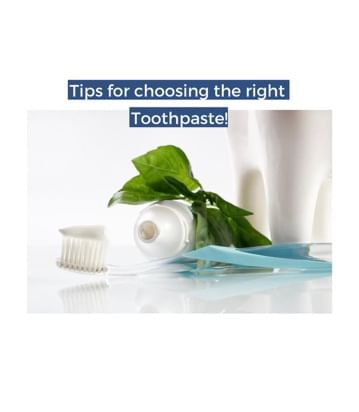Tips For Choosing The Right Toothpaste!
Choosing a toothpaste that can take care of your specific dental needs/problems can be a daunting task.
It's important to choose correct toothpaste that meets your individual dental needs as every personâs body chemistry is different. For eg- a particular brand of toothpaste loved by your colleague, may not resolve your dental problem. You might also see that you are sensitive to a certain type of ingredient.
Most toothpaste tend to target one or more of the following dental conditions or needs, like-
Fluoride toothpaste also called anti-decay - Toothpaste as fluoride strengthens your tooth enamel, which helps to prevent tooth decay. For people over the age of six, using fluoride toothpaste is a good idea. Older children, teens and adults whose teeth are fully developed are not at risk for fluorosis
Fluoride toothpaste dangers - No type of toothpaste, whether it has fluoride or not, is meant to be swallowed. If fluoride toothpaste is swallowed by children whose teeth are still developing (up to about 8 years of age), they can develop a condition called fluorosis in which excessive fluoride interferes with the development of tooth enamel. This causes white spots or streaks on the teeth that can become darker with age.
Desensitizing toothpaste - If hot or cold food and drinks bother your teeth, a desensitizing toothpaste is a good choice. It contains ingredients such as potassium nitrate or strontium chloride, which block transmission of sensation from the tooth surface to the nerve.
Desensitizing toothpaste dangers - These toothpaste are great at masking sensitivity and make you feel better but prolong use must be avoided. Many times prolong use could mask symptoms of something bigger like a deep filling or even a root canal. If sensitivity still persists after 4 weeks of usage then consult your dental practitioner. Make sure to treat the root cause of your sensitivity to protect your teeth from getting worse.
Tatar control toothpaste - If your goal is to help reduce the buildup of plaque, tartar deposits, or calculus, on your teeth, choose a paste with pyrophosphates, zinc citrate and must also contain fluoride. Tartar is hardened plaque bacteria and is formed within 24 hours if plaque isnât properly removed. Tartar can only be removed during professional dental cleaning as it has to be scaled away and canât be removed with a toothbrush. The problem with tartar is that it can irritate and inflame the gums, increasing the risk of disease.
Tooth whitening toothpaste - These contain certain chemicals and mild abrasives designed to help remove surface stains. For whiter teeth, choose toothpaste with sodium hexametaphosphate, which will help remove surface stains and prevent new ones from forming. It can take care of extrinsic stains like tea, coffee, tobacco stains, etc) but not helpful in case of intrinsic stains (tooth trauma or aging, etc)
Tooth whitening toothpaste dangers - Your teeth may become more sensitive if you already have sensitivity issues. Some ingredients can cause gum irritation.
Due to the comprehensive range of toothpaste available in the market, you may find a lot of toothpaste that are designed to do more than one job, making it difficult to choose the right toothpaste or what ingredients to go for.



+1.svg)
